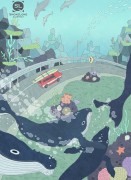I like the simplicity of the syntax here—those direct subject-verb constructions that sort of mimic rock chords. How do you typically construe sentences as a writer, and does this piece represent a departure from that approach?
Thanks for that. “Metalhead’s Guitar Lessons” is part of a series of flashes about this kid Metalhead growing up in the Midwest during the 1980s. Each flash is right around three hundred words, so I’m trying to get a lot of story told in that little tiny space. There isn’t a lot of room for stylistic flourish—I’ve had to pare a lot of the sentences back in order to make the word count, which results in some really spare sentences, but this allows me to consciously think about creating room in the piece for the syntax to change, for more complex sentence structures that veer away from the simple ones, which I hope raises tension. That’s the idea, anyways—rising syntax to parallel (or sometimes to make up for the lack of) rising action.
And as a writer, I have found a lot of joy in working with simple syntax. It’s weirdly fun.
I have to wonder about your motives, Todd. Are you mocking metalheads from afar? My guess is no—but to what degree is this your world, too?
I was in eighth grade when Shout at the Devil by Mötley Crüe was released. That album changed how I thought about the world. Back in the eighties, heavy metal was what brought a lot of kids together, kids who would not otherwise be friends. If you had heavy metal in common, that was enough to forge a friendship, even if it was only for the duration of a song. I have this memory of being the nerdy Asian American kid in social studies class and telling someone how much I liked Shout at the Devil. An older kid heard me say that and he was like, You like Crüe? I said yes, and he gave me that head nod that said, You’re OK, kid. When I look back on that time, he was really kind of a jerk, but man was I stoked that an older kid thought I wasn’t completely nerdy.
I ended up buying an electric bass guitar at a garage sale and teaching myself to play after school: hours upon hours playing along with Iron Maiden and Black Sabbath records every afternoon. And then I ended up playing bass in rock bands on the circuit in Seattle for several years after high school instead of going to college. So, for me, heavy metal is a big part of how I think about who I am from way back. Yes, I am mocking metalheads in “Metalhead’s Guitar Lessons,” but it’s not from afar. It’s from up close. I’m still pretty nerdy.
You’re a grownup who occasionally needs to wear a tie. What is the perfect metal selection to pump you up for, say, a faculty meeting, or for some other occasion when your life is light years from metal?
Motörhead. It’s always Motörhead. Usually their song “Iron Fist” or “Killed By Death.” Sometimes I imagine that song is playing full volume when I walk into a meeting or a classroom. Then the pyro goes off in my head and we are down to business. Even when my life seems to be light years away from heavy metal, heavy metal isn’t light years away from me.
I know this is SmokeLong Quarterly, a fiction journal—but aren’t these really poems? How do you know what you’ve written when you’ve written something like this? Of course, I’m primarily a poet, so I’m sort of extending the secret handshake here.
Am I busted now, or what? I know, that bit about rising syntax was such a “poetry thing” to say. Really, though, I think that when flash gets super short, it has to rely on some of those tools we use to write poems. It’s like we have this writer’s toolbox and there are fiction tools on one side and poetry tools on the other, and sometimes in order to make sure the car doesn’t fall apart when someone tries to drive it, we have to use tools from the opposite side of the box. So I think this story is really short fiction more than a poem because although I’m using a lot of poetry tools here, the elements that really make the engine go are really more from the fiction side: character, setting and interior landscape, time shifts, and so forth.
But sure. Maybe it’s really a poem. Please don’t tell the other SmokeLong editors?
I snuck a peek at your webpage, where you note that you’re “not virtuous enough to be a superhero.” On the spot, right now, please manufacture a superhero identity for yourself. What is your name? What are your powers? What is your kryptonite?
I’m currently at my mother’s house in Seattle. My father is sick and we are here to visit him. It’s been three years since I’ve been back in Seattle, and I’ve got all this work piling up on my desk at home. It’s just after midnight and I’m sending you the answers to this interview a bit later than you wanted them, and then I have some e-mailing to do. My family is sleeping in the next room. I can hear my son make these little crying noises—then my partner settles him down, and I really want to be in there with them, but I’m coming down with a cold and I don’t want them to catch what I’ve got. I want my superhero name to be Dad. My superpowers are the ability to bend time so I can satisfy all my real-world responsibilities and still be able to be with my kid. My kryptonite is the secret knowledge that no matter what powers I have, I won’t be able to save everyone.



 The core workshop of SmokeLong Fitness is all in writing, so you can take part from anywhere at anytime. We are excited about creating a supportive, consistent and structured environment for flash writers to work on their craft in a community. We are thrilled and proud to say that our workshop participants have won, placed, or been listed in every major flash competition. Community works.
The core workshop of SmokeLong Fitness is all in writing, so you can take part from anywhere at anytime. We are excited about creating a supportive, consistent and structured environment for flash writers to work on their craft in a community. We are thrilled and proud to say that our workshop participants have won, placed, or been listed in every major flash competition. Community works.